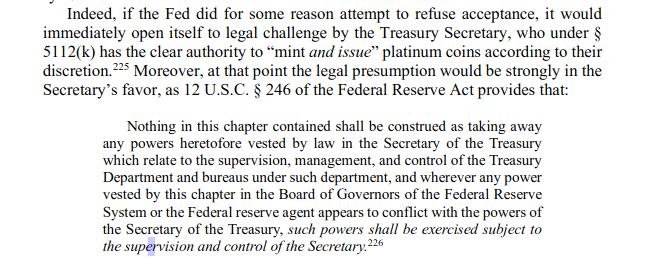
There have been a lot of #notallstablecoin takes flying around from crypto advocates in the last few days. It's worth reiterating a few points from the last time we were going around on this topic.
First, while there are obviously differences between models of stablecoins, and
First, while there are obviously differences between models of stablecoins, and
Specific stablecoins - whether there's a single central issuer, whether it's backed by collateral, what kind of collateral, whether it relies on an algorithmic or actively managed stabilization approach, etc - these differences are all focused on the "backing" side of things.
When it comes to the obligation or liability side, all of these coins are essentially promising the same thing - a fixed or stable nominal price and redemption into a higher form of money/liquidity on demand. Some bury disclaimers in fine print or even quite explicitly say they
Promise no such thing, but those claims are belied by the actual *function* the coins are designed to and do serve, which is to be shadow money in markets/contexts where official monies are either not allowed or dare not go.
What this means is that depending on how you look at
What this means is that depending on how you look at
It, different models of stablecoins are either distinct things, or all variations of the same thing - a money promise with *some theory of backing*.
Second, while these backing models are distinct, they share one important feature in common, which is that they are denominated
Second, while these backing models are distinct, they share one important feature in common, which is that they are denominated
In a public unit of account and are safe only one the extent the public can (ultimately) exit their position into official money. And in the history of (shadow) banking, there has only been one successful way to consistently ensure that kind of safety: a direct guarantee by the
Monetary authority itself, either through some form of ex ante insurance or ex post bailout.
What this means is that while there may be (are) regulatory and legal changes that would improve the relative safety of, say, custodial stablecoins, or decentralized stablecoins, etc,
What this means is that while there may be (are) regulatory and legal changes that would improve the relative safety of, say, custodial stablecoins, or decentralized stablecoins, etc,
Each of those solutions is at best addressing downstream model-specific problems while leaving the biggest, common problem unacknowledged, yet alone resolved.
The real question we should be asking ourselves today is not whether algorithmic stablecoins are uniquely bad - they
The real question we should be asking ourselves today is not whether algorithmic stablecoins are uniquely bad - they
Very well may be - but rather whether or not it's worth focusing our energy on addressing those unique bads rather than go to the root of the problem and address it directly, once and for all, across all the entire stablecoin industry.
This was our thinking behind the STABLE Act, drawing inspiration from @MorganRicks1's book, the Money Problem among other sources, and it holds up today.
Because at the end of the day, the problem I described as the "Schrodinger's Coin" problem-that whether or not a particular
Because at the end of the day, the problem I described as the "Schrodinger's Coin" problem-that whether or not a particular
Stablecoin's chosen theory of backing is sound or not can only ever be verified at the point where failure means serious consumer harm-remains true. True for Tether, true for Terra, true for USDC and all the others. Banking history is littered with examples of private monies that
Were issued by actors that were convinced this time would be different, that they had cracked the code and would be impervious to systemic risk of failure, etc. Over and over they were proved overly hubristic and it was the public that suffered.
Let this time be the last time.
Let this time be the last time.
• • •
Missing some Tweet in this thread? You can try to
force a refresh











